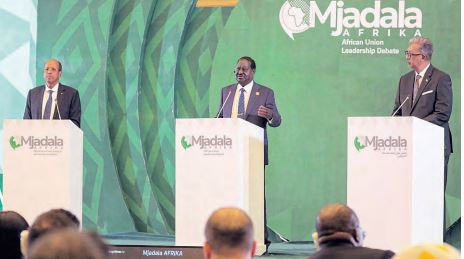
During the Mjadala Afrika debate, all the candidates for the African Union Commission chairmanship Raila Odinga of Kenya, Mahmoud Ali Youssouf of Djibouti and Richard James Randriamandrato of Madagascar unanimously agreed that Africa must prioritise exploiting its domestic market before focusing on external trade.
To enhance intra-African trade, both the African Union Commission and African heads of state must make strategic decisions without the interference of geopolitics, which continues to hinder the continent’s economic progress.
Africa, with a population of 1.5 billion and abundant natural resources, also possesses the world’s largest youth population.
If leveraged correctly, these factors could drive significant economic growth and help eradicate poverty.
However, Africa struggles with a lack of clear strategies to capitalise on global opportunities, as well as insufficient commitment from some leaders.
For instance, all African countries, except Eswatini, are members of the Forum on China-Africa Cooperation and the Belt and Road Initiative, both of which offer numerous opportunities to boost intra-African trade and transform the continent into a manufacturing hub.
Despite the African Continental Free Trade Area being operational, intra-African trade remains low at just 15 per cent, compared to 50-75 per cent in the European Union.
This reflects Africa’s heavy reliance on external trade despite its potential for growth through domestic trade.
To address this gap, Africa must focus on improving its infrastructure, particularly in roads and railways, to facilitate connectivity between regions.
This will not only support trade within Africa but also enhance the flow of goods, services and ideas across the continent.
To achieve this, Africa needs development partners who are committed to bridging its infrastructure deficit.
The continent faces an annual infrastructure funding gap of around $100 billion.
To improve intra-African trade, it is crucial to strengthen connectivity between regional blocs such as the Southern African Development Community, Common Market for Eastern and Southern Africa, the Economic Community of West African States and others.
These improvements will support the implementation of AfCFTA and the AU’s Agenda 2063. FOCAC and the BRI have played a significant role in helping many African nations meet their infrastructure needs.
China has provided both funding and expertise, with projects that have boosted local businesses and improved the lives of many.
Unlike Western countries, which often impose conditions on their aid, China has focused on large-scale infrastructure projects that deliver tangible benefits.
This approach has seen the development of roads, railways, ports and other essential infrastructure, which have had an immediate and visible impact on economic growth.
While the West has primarily focused on capacity building, governance and human rights, China’s focus on infrastructure has brought more immediate results for many African countries.
For instance, roads, railways and ports have played a vital role in improving trade and access to markets, which has directly contributed to economic growth.
This is in contrast to the long-term, intangible programmes supported by institutions like the International Monetary Fund and World Bank, which often have less visible effects.
During the ninth FOCAC meeting in September, President Xi Jinping outlined 10 partnership action plans to be implemented over the next three years, covering areas such as trade, industrial cooperation, connectivity, agriculture, health and security.
If fully implemented, these initiatives could provide significant support for African economies, particularly those struggling with infrastructure deficits.
China’s promise to fund 30 infrastructure projects is expected to play a crucial role in addressing Africa’s infrastructure gap.
Once completed, these projects will make it easier for Africa to enhance intra-African trade, potentially increasing it from 15 per cent to more than 50 per cent.
Improved infrastructure, such as roads and railways, will facilitate the movement of goods, people and ideas within local communities and across regions.
Several key road networks, such as the Cairo-Dakar highway, Lagos-Mombasa route and others, have stalled due to lack of funding and geopolitical challenges.
By putting aside these geopolitical barriers and working with reliable partners like China, Africa can complete these vital networks and significantly enhance intra-African trade.
China’s financial support to Africa comes through a mix of credit funds, aid and private investment.
Beijing has reassured African leaders that it will deepen cooperation in industry, agriculture, infrastructure, trade and investment, further aligning with Africa’s vision of industrialisation.
To build a China-Africa community with a shared future, both sides must work together to implement FOCAC’s outcomes. Africa, however, must adopt a unified approach rather than the individualistic strategies that have hindered progress in the past.
While China has committed to
helping Africa industrialise, the lack
of a collective approach has often
undermined the success of these
initiatives.



